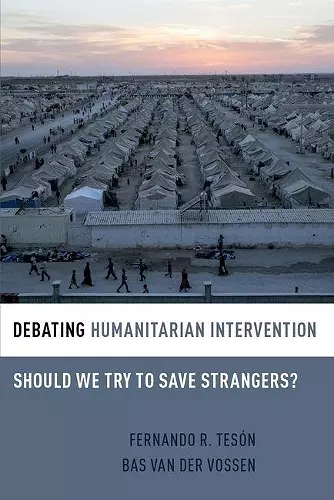Debating Humanitarian Intervention
Should We Try to Save Strangers?
Bas van der Vossen author Fernando Teson author
Format:Paperback
Publisher:Oxford University Press Inc
Published:16th Nov '17
Currently unavailable, currently targeted to be due back around 25th January 2025, but could change
This paperback is available in another edition too:
- Hardback£165.00(9780190202903)

When foreign powers attack civilians, other countries face an impossible dilemma. Two courses of action emerge: either to retaliate against an abusive government on behalf of its victims, or to remain spectators. Either course offers its own perils: the former, lost lives and resources without certainty of restoring peace or preventing worse problems from proliferating; the latter, cold spectatorship that leaves a country at the mercy of corrupt rulers or to revolution. Philosophers Fernando Tesón and Bas van der Vossen offer contrasting views of humanitarian intervention, defining it as either war aimed at ending tyranny, or as violence. The authors employ the tools of impartial modern analytic philosophy, particularly just war theory, to substantiate their claims. According to Tesón, a humanitarian intervention has the same just cause as a justified revolution: ending tyranny. He analyzes the different kinds of just cause and whether or not an intervener may pursue other justified causes. For Tesón, the permissibility of humanitarian intervention is almost exclusively determined by the rules of proportionality. Bas van der Vossen, by contrast, holds that military intervention is morally impermissible in almost all cases. Justified interventions, Van der Vossen argues, must have high ex ante chance of success. Analyzing the history and prospects of intervention shows that they almost never do. Tesón and van der Vossen refer to concrete cases, and weigh the consequences of continued or future intervention in Syria, Somalia, Rwanda, Bosnia, Iraq, Lybia and Egypt. By placing two philosophers in dialogue, Debating Humanitarian Intervention is not constrained by a single, unifying solution to the exclusion of all others. Rather, it considers many conceivable actions as judged by analytic philosophy, leaving the reader equipped to make her own, informed judgments.
the book is an excellent contribution in terms of bringing together different arguments on intervention, the moral dilemma involved and the implicit political logic...the book...presents a much more condensed and balanced overview. It would be of great help to students and researchers working on issues pertaining to sovereignty, international justice, intervention and non-intervention to find multiple sources in a single book. * Abhishek Choudhary, Jawaharlal Nehru University, Human Rights Review *
this book provides an important overview of the humanitarian intervention debate and forces the reader to rethink both the conditions under which humanitarian intervention can be justified, as well as the limitations of military responses in addressing humanitarian need. As a result, this book will be of interest to both academics and students wishing to challenge their own underlying assumptions about humanitarian intervention, on either side of this long-running debate. * Garrett Wallace Brown and Samuel Jarvis, E-International Relations *
The authors of this superb book have carefully identified the central moral questions raised by humanitarian intervention, such as whether respect for state sovereignty has priority over the defense of individual human rights, whether intervention is more difficult to justify than revolution, whether justification depends on the evidence at the time of action or on the actual outcome, and so on. On these and other issues, they argue for opposing views. The result is a lively, accessible, and comprehensive discussion of both the morality of humanitarian intervention and what the law that governs intervention ought to be. * Jeff McMahan, White's Professor of Moral Philosophy, University of Oxford *
Fernando Tesón and Bas van der Vossen provide thoughtful and perceptive reflections on the ethics of intervention. Their disagreements are illuminating and strike at the heart of the philosophical debates over the permissibility of humanitarian intervention and, more broadly, the ethics of war. I highly recommend this book for both scholars and students of the ethics of intervention. * James Pattison, Professor of Politics, University of Manchester *
ISBN: 9780190202910
Dimensions: 208mm x 137mm x 18mm
Weight: 340g
288 pages